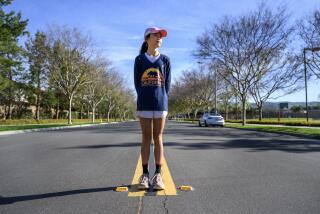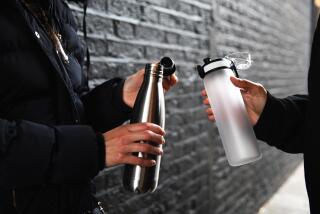A close call at the finish line
- Share via
THE last thing I remember is feeling slightly dizzy in the final mile. Until then, everything was great at the Reggae Marathon in Jamaica, where my friend Rita Whitney and I were walking the 26.2-mile course to celebrate my 50th birthday.
The next thing I remember is waking up from a coma four days later in the intensive care unit at Duke University Medical Center, with no idea how I got there. I have no memory of completing the race, then collapsing just past the finish line. I don’t recall suffering three seizures and three episodes of atrial fibrillation (irregular heartbeat), or being hooked to a ventilator and flown by air ambulance home to North Carolina.
Now, 16 months after the December 2003 race, I still get chills knowing that my husband and two children didn’t know whether to expect my death, recovery or permanent disability. All because I drank too much water.
Hyponatremia, or “water intoxication,” is a growing and potentially lethal problem -- especially for people who walk or run for four hours or more and are highly vigilant about hydration. Drinking large amounts of fluid while losing salt in sweat can dilute the salt content of the blood so much that it interferes with brain, heart and muscle function. This electrolyte imbalance can lead to brain swelling, seizures, coma and even death.
The surprising danger of fluid overload became stunningly clear in 2002, when two healthy women died of hyponatremia: Hilary Bellamy, 35, at the Marine Corps Marathon in Washington, D.C., and 28-year-old Cynthia Lucero at the Boston Marathon. “It’s a particular problem for novice and charity runners,” says Dr. Arthur Siegel, a medical team leader for the Boston Marathon, which is being run today. Many inexperienced marathoners still believe the outdated notion that you can’t drink too much, he says, “and they’re moving slowly enough to become overloaded with fluid.”
First reported in 1985 in four ultra-marathon runners by Dr. Timothy Noakes, a professor at the University of Cape Town and the Sports Science Institute of South Africa, exercise-associated hyponatremia is most often seen in endurance athletes and soldiers. More than 250 cases of cerebral edema (brain swelling) -- seven of them fatal -- have been reported in the literature, according to Noakes’ research, published in the British Medical Journal in 2003.
The disorder was once “a rare and singular phenomenon” but has become more common since the early 1990s, says Dr. Tamara Hew-Butler, a doctor of podiatric medicine who began researching the disorder after serving as assistant medical director of the 1999 Houston Marathon. That year four runners were hospitalized in comas with critical hyponatremia.
Scientists are still debating the specific mechanisms of the disorder, says Hew-Butler, who helped host an international science conference about hyponatremia last month in South Africa. The scientists at the meeting expect to publish a statement this summer on prevention and treatment of the illness. “The incidence of this life-threatening condition is now being reported at an alarming rate,” says Hew-Butler, who cites some of the following examples:
* A post-race blood study done on 488 participants in the 2002 Boston Marathon found that 13% experienced hyponatremia, according to research published in last week’s New England Journal of Medicine. “Considerable weight gain while running, a long racing time and body-mass-index extremes were associated with hyponatremia,” Dr. Christopher S.D. Almond and colleagues conclude.
* In the 1998 and 1999 Suzuki Rock ‘N’ Roll Marathon in San Diego, 26 people were hospitalized with hyponatremia, including 15 with severe cases, according to research published in the Journal of Emergency Medicine in July 2001. Three suffered seizures and required intubation and admission to an intensive care unit.
* In the 2000 Houston Marathon, 21 entrants were treated for hyponatremia symptoms, and 16 of those marathoners were sent to the hospital, Hew-Butler reported in the Clinical Journal of Sports Medicine in January 2003.
“We used to tell people to drink as much as you can,” says Dr. Bill Roberts, president of the American College of Sports Medicine. But “that was back when marathoners were elite runners who finished in two to four hours.” Roberts says the risk of hyponatremia has grown in recent years as more “average folks” have participated in marathons by walking and jogging. “Now some marathoners take seven or eight hours to finish,” he says, “and it’s not uncommon for people to drink two cups or more at every aid station.”
Contrary to what some people think, “sports drinks are not protective” against hyponatremia, Dr. Benjamin Levine and Dr. Paul D. Thompson write in the current issue of the New England Journal of Medicine. Noting that sports drinks are mostly water and a little bit of salt, Levine says that “people sweat at different rates and lose salt at different rates,” so a standard formula for hydration does not work for everyone. “Let thirst be your guide,” he advises.
To increase awareness of hyponatremia, Roberts and other doctors who work with marathons have advised reducing the number of water stops during races. Two marathons, Houston and Boston, now put scales along the route so participants can see if they are retaining excess water, which indicates hyponatremia. Other symptoms include confusion, dizziness, nausea, shortness of breath, progressive headache and swollen hands and feet.
At the Los Angeles Marathon, people with symptoms of hyponatremia are given a quick, finger-prick blood test, says Dr. Rudra Sabaratnam, the race’s medical director and himself a marathoner. “If sodium levels are low,” he says, “they are sent to the hospital for treatment.”
In 2003, the first year such testing was done, “and a very hot day,” he says, “three people were sent to the hospital. This year it was much cooler, and we had no problems.”
In response to growing concern about hyponatremia, USA Track & Field, the national governing body for long-distance running, issued new hydration guidelines in 2003, advising runners to drink based on individual need, but no more than 800 milliliters (about 3 1/2 cups) per hour. Despite this advice, a recent study found significant incidence of hyponatremia among 140 runners who collapsed during or immediately after the 2003 Boston Marathon. This suggests that “either the new guidelines are inadequate or athletes are not always following the guidelines,” wrote Dr. Alexander Kratz and colleagues in the Archives of Pathology Laboratory Medicine in February.
At some races, medics and volunteers also are not following these guidelines, still mistakenly assuming that a marathoner in trouble is dehydrated. When I complained of dizziness at the Reggae Marathon, kindly folks in the first-aid van sat me down and had me drink several cups of water -- exacerbating my condition.
Finding the balance between drinking enough to avoid dehydration, but not so much that you run the risk of hyponatremia is tricky. The best advice: Weigh yourself before and after your training runs or walks. If you gained weight, drink less fluids next time. Some experts also suggest eating salty snacks, such as pretzels, during races lasting longer than four hours. This may be particularly helpful for people who find white, powdery stains on their exercise clothes, which suggests that they are “salty sweaters.”
Also, some evidence indicates that taking nonsteroidal anti-inflammatory drugs such as ibuprofen may increase risk, most likely by interfering with how the kidneys excrete salt and water in urine. “The jury is still out on the safety of these medications,” Hew-Butler says.
The good news is that even people who become severely ill, like me, can fully recover. My brush with death has been a life-altering experience, and I’ve emerged with a sort of “post-traumatic bliss syndrome” that makes each day even more precious. It was a far more dramatic observance of my 50th birthday than I’d planned.
So, for Rita’s 40th birthday this year, we went to a resort.
*
(BEGIN TEXT OF INFOBOX)
Resources
* The American Medical Athletic Assn. offers information on the right way to hydrate for marathons at www.amaasportsmed.org or call (800) 776-2732.
* The Assn. of International Marathons and Road Races provides hydration guidelines at www.aims-association.org.
* U.S. Track & Field’s fluid replacement guidelines are available at www.usatf.org/groups/Coaches/library/hydration/.
More to Read
Sign up for The Wild
We’ll help you find the best places to hike, bike and run, as well as the perfect silent spots for meditation and yoga.
You may occasionally receive promotional content from the Los Angeles Times.






